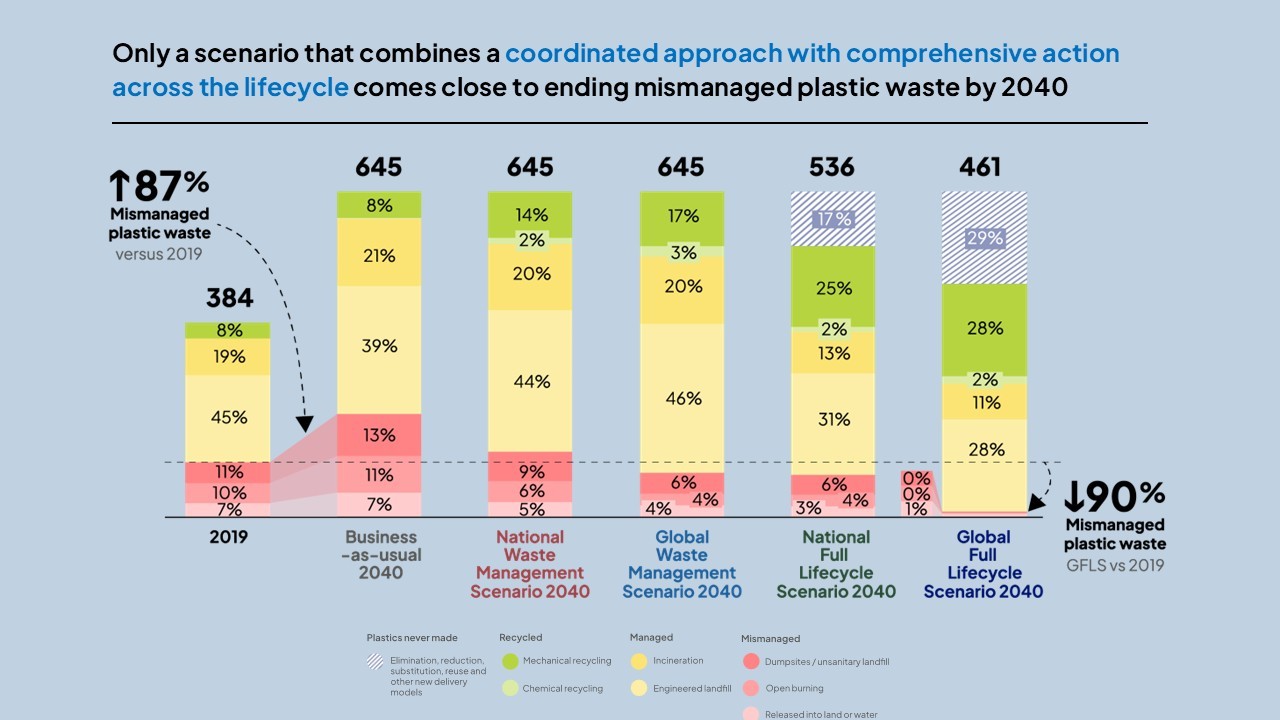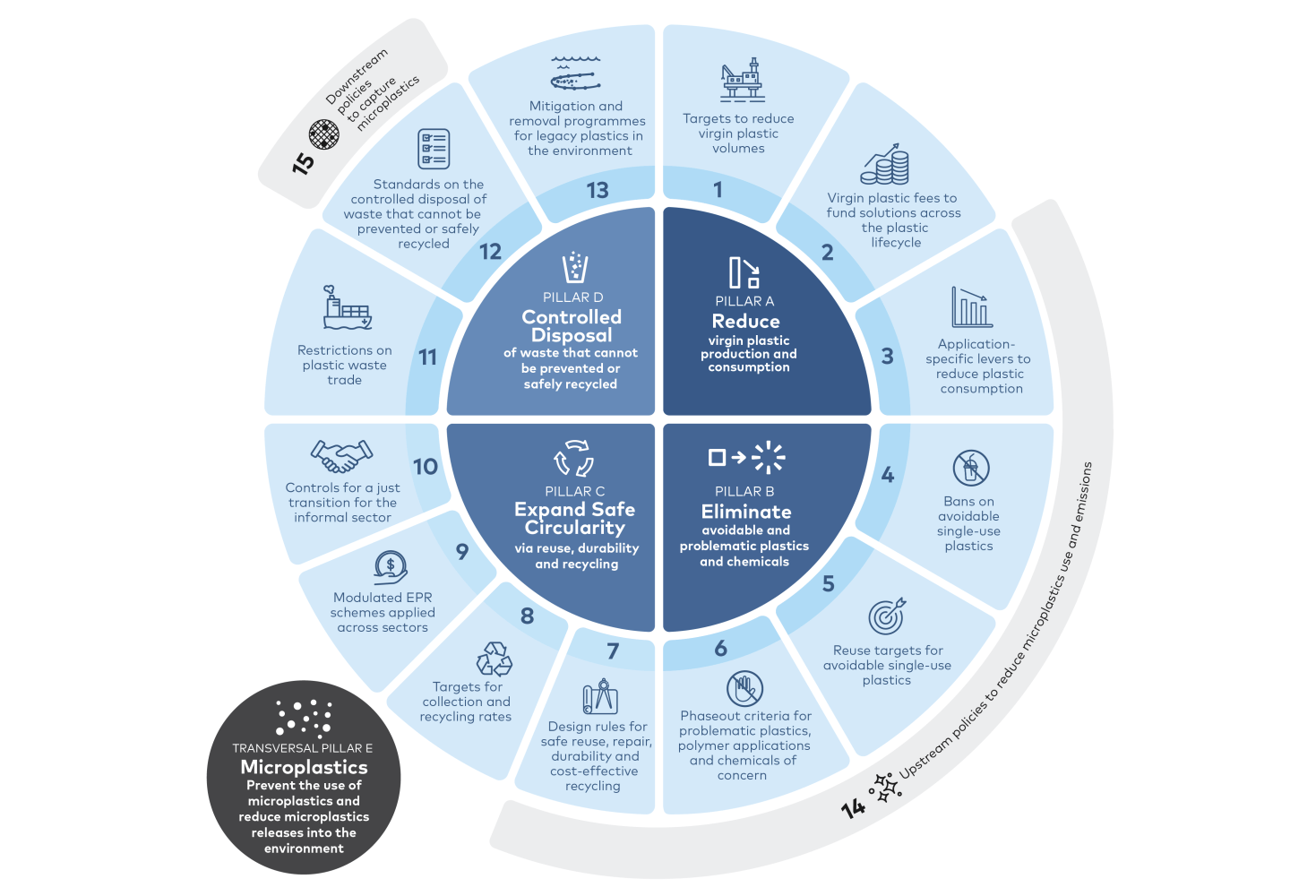Despite the tireless efforts for an ambitious Global Plastics Treaty, delegates left Busan, South Korea, without the final agreement many had hoped for.
Yet INC-5 confirmed that more than 100 countries remain committed to a systemically effective treaty. Yoni Shiran, Systemiq Partner and Plastics Lead, explains why global rules matter, and considers the road ahead.
As I return from Busan, South Korea, where negotiators gathered last week for the fifth round of negotiations (INC-5) for a Global Plastics Treaty, a few reflections come to mind. Despite the tireless efforts of the Chair and government representatives, we left without the final agreement many had hoped for. Over 140 countries supported a fairly ambitious treaty, yet a coalition of ‘like-minded’ nations – led by Saudi Arabia, Iran, and Russia – blocked progress.
The sticking points? Which, if any, plastic products and chemicals of concern should be banned or phased out (Article 3), requirements for product design (Article 5), financing mechanisms (Article 11), supply side measures and production targets (Article 6), and the mechanism to ensure the Treaty can be strengthened over time.
These aren’t minor issues but cut to the core of how we tackle the plastic pollution crisis. The outcome is undeniably frustrating and not what we had hoped for.
And yet, I returned home with a sense of cautious optimism. One critical silver lining emerged: more than 100 countries – led by the High Ambition Coalition under strong leadership from Norway, Rwanda, the EU, the UK, and Small Island Developing States (SIDS) – refused to settle for a watered-down, lowest-common-denominator agreement based on voluntary measures. They held the line, rejecting a weak treaty that would have done little to address this systemic problem. This is a significant achievement.
A strong coalition for change
What’s also encouraging is the increased alignment on key issues. Never before have so many countries aligned on the importance of upstream action, including design guidelines, global phase-outs of harmful chemicals and/or unnecessary plastics, and establishing sustainable levels of plastic production. The INC Chair’s latest non-paper also advanced important conversations on product design and waste management, laying the groundwork for the next round of talks.
In parallel, the Business Coalition for a Global Plastic Treaty – comprising over 260 members – sent a powerful message: enforceable global rules are essential. Systemiq is proud to be part of this coalition, having helped shape its Vision Statement.
Why global rules and a full lifecycle approach matter
Earlier this year, Systemiq published Plastic Treaty Futures, a report that assessed the environmental, economic, and social implications of different treaty scenarios. The findings were clear: only a legally binding, globally coordinated treaty addressing the entire plastic lifecycle can meaningfully reduce plastic pollution by 2040. This approach is not only environmentally essential but also economically wise.
Our “Global Full Lifecycle Scenario” could:
- Reduce mismanaged plastic waste by 90% by 2040 compared to 2019 levels.
- Save approximately $200 billion in cumulative public expenditure between 2026 and 2040, compared to a Business-as-Usual scenario.
- Create sustainable growth opportunities across all regions – with shifts in economic activity towards circular business models and materials management creating new value pools and jobs that more than offset limited declines in plastic production.
However, the report also highlighted that without significant funding to scale up effective waste management in low-and-middle-income countries, even the most ambitious treaty would fall short in tackling mismanaged plastic waste.
In contrast, a treaty focused solely on national waste management measures without binding global rules, would do little to stem the growing tide of plastic pollution. Our analysis, based on a peer-reviewed methodology and reviewed by a distinctive expert panel, shows that such a treaty would see an increase of 18% in plastic pollution by 2040 compared to today’s levels. While that represents a 35% reduction of plastic pollution compared to a business-as-usual scenario, this would be a missed opportunity for the Global Plastic Treaty to meaningfully address plastic pollution.
The exhibit below shows the fate of plastics under different Treaty scenarios, as published in Plastic Treaty Futures.

Only a scenario that combines a coordinated approach with comprehensive action across the plastic lifecycle will come close to ending mismanaged plastic waste by 2040. Source: Systemiq (2024). Plastic Treaty Futures.
The road ahead
The next round of negotiations (INC-5.2) has not been scheduled yet, but the choice before governments is clear: will they pursue a universally accepted but toothless treaty, or will they push for a bold, binding and global agreement that addresses the entire lifecycle of plastics? The majority of governments, businesses, and citizens clearly prefer the latter, and that’s the path Systemiq will continue to advocate for.
In our recent publication Towards Ending Plastic Pollution by 2040, commissioned by the Nordic Council of Ministers for the Environment and Climate, we have suggested, alongside a leading expert panel, what a package of 15 policies that would constitute an ambitious treaty could look like, as shown below.

There’s no time to waste. The stakes clearly extend beyond plastic pollution – this is an opportunity for global collaboration at a time when trust in multi-lateral processes is low, and when we need it most. Let’s prove that the world can tackle global challenges with collective action and meaningful, systemic solutions.
At Systemiq, we’ve been deeply involved in shaping the path towards an ambitious global plastic treaty. If you’re interested in diving deeper, here are a few key resources:
- Towards Ending Plastic Pollution by 2040, which presents a set of 15 global policy interventions towards ending plastic pollution which are essential for a truly ambitious treaty.
- Plastic Treaty Futures, a comparative analysis of four treaty scenarios, clearly showing that only a global, legally binding agreement covering the full plastic lifecycle can significantly reduce plastic pollution by 2040.
- Turning Off the Tap, co-authored with UNEP and providing key insights for negotiators.
We will continue to contribute rigorous, evidence-based insights to help prioritise effective solutions and shape an ambitious treaty. If you’d like to discuss any of these insights further, please get in touch at [email protected].


